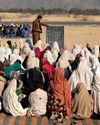
His daily ritual, however, was interrupted when the windows began to rattle and his house shake. As the sound of dozens of low-flying war planes and airstrikes grew louder, it became clear that this was more than the occasional bout of shelling he had got used to.
"It was a very hard night and an even harder morning... It feels like it's too near, nobody could sleep," Abu Khudoud, a shopkeeper in the city of Nabatieh in south Lebanon, said.
Last Sunday, Israel carried out its most intense aerial barrage on Lebanon since the war in Gaza began in October, launching more than 40 airstrikes across nearly 30 locations. Israeli officials claimed the attack was pre-emptive, directed at Hezbollah missile launchers aimed at targets inside Israel, detected by intelligence agencies the day before.
Lebanon's health ministry said three people were killed in the airstrikes, with two more injured. Hezbollah and its allied political party, Amal, announced the death of three of their fighters a few hours later.
Despite the flurry of airstrikes, Hezbollah proceeded with an attack of its own, hitting 11 military sites across Israel with a combination of drones and more than 320 Katyusha rockets. In a statement, the Lebanese group said it was the "first phase" of a retaliation for Israel's killing of its top military commander, Fuad Shukr, in Beirut nearly a month earlier.
This story is from the {{IssueName}} edition of {{MagazineName}}.
Start your 7-day Magzter GOLD free trial to access thousands of curated premium stories, and 9,000+ magazines and newspapers.
Already a subscriber ? Sign In
This story is from the {{IssueName}} edition of {{MagazineName}}.
Start your 7-day Magzter GOLD free trial to access thousands of curated premium stories, and 9,000+ magazines and newspapers.
Already a subscriber? Sign In

Friendship interrupted
They were best mates. Then one had a baby, while the other struggled to conceive. They share their brutally honest takes on what happens when motherhood affects friendship

KERNELS OF HOPE
During the siege of Leningrad, botanists in charge of an irreplaceable seed collection, the first of its kind, had to protect it from fire, rodents-and hunger

A new horizon' The inverse link between cancer and dementia
Scientists have long been aware of a curious connection between these common and feared diseases. At last, a clearer picture is emerging

Across the universe
Samantha Harvey won the Booker prize with a novel set in space. Yet, she says, Orbital is actually 'a celebration of Earth's beauty with a pang of loss'

Frank Auerbach 1931 -2024
Saved from the Holocaust, this artist captured the devastation of postwar Britain as ifits wounds were his own but he ultimately found salvation in painting

Seven lessons I've learned after 28 years as economics editor
Margaret Thatcher was Britain's prime minister and Neil Kinnock was leader of the Labour party.

Droughtstricken dam leaves economies powerless
A ll is not well with the waters of Lake Kariba, the world's human-made lake largest A punishing drought has drained the huge reservoir close to record lows, raising the prospect that the Kariba Dam, which powers the economies of Zambia and Zimbabwe, may have to shut down for the first time in its 65-year history.

Let this be the end of these excruciating celebrity endorsements
I wish celebrities would learn the art of the French exit. But they can't, which is why Eva Longoria has announced she no longer lives in America. \"I get to escape and go somewhere,\" she explained.

Alive, but unable to thrive under absolute patriarchy
Since the Taliban returned to power, women and girls have tried defiance, but despair at their harshly restricted lives

‘It's tragic’ Reflection in the wake of Amsterdam violence
Carrying signs scrawled with messages urging unity, they laid white roses at the statue of Anne Frank, steps away from the home where her family had hidden from Nazi persecution.